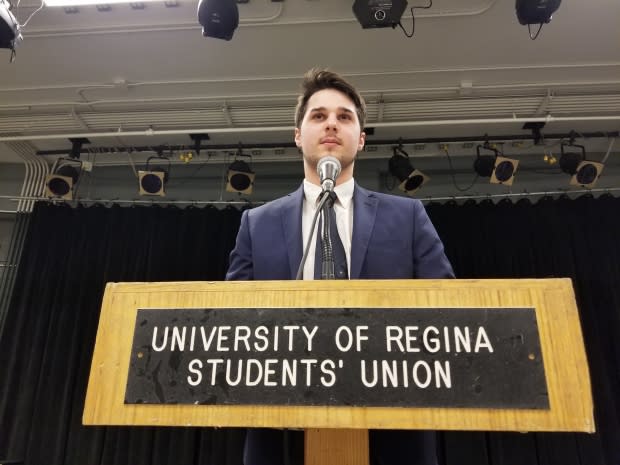Sask. university students worried about rising tuitions, labour strife after flat provincial budget

Students at Saskatchewan's two universities are concerned about this year's provincial budget.
The province kept funding for post-secondary institutions flat this year at $728 million. While there were no cuts made, students are worried that rising costs are going to be shouldered by students through tuition.
"Zero percent is always going to have consequences," said Brent Kobes, vice-president operations and finance of the University of Saskatchewan Students Union (USSU). "Balancing the budget on the backs of students is not something that the USSU wants to see, nor is it really sustainable in the long run."
This is the second year in a row that post-secondary money from the province has stayed static.
The students' union is concerned that costs for already-negotiated labour contracts for university faculty and staff, as well as rising costs for general maintenance, will continue to rise.
According to numbers from the USSU, tuition made up roughly 26 per cent of the university's budget in 2016, an increase of four per cent from 2011. Kobes said it's a worrying trend.
"Affordability is our organization's number one concern," he said. "We really are hoping to move towards more predictability in pursuing post-secondary education."
It's not clear whether tuition rates will rise for students this year. Last year, Arts and Sciences students at the University of Saskatchewan saw their tuition rise by 4.8 per cent, while tuition was raised at the University of Regina by 2.8 per cent.
The president of the University of Regina's student's union (URSU) said tuition has become a serious concern for students and that use of emergency services like counselling and the food pantry is on the rise.
"Students are definitely not taking the budget conditions well right now," said URSU President Shawn Wiskar. "There's a lot of fears about people not being able to continue with their education."
University of Regina President and Vice-Chancellor Vianne Timmons said the institution works very hard to keep tuition affordable.
"We are in the bottom third of English universities in Canada in tuition and that's kind of where we try to stay," Timmons said.
"Last year we kept the tuition quite low and we're going to continue to focus on that going forward."
Wiskar said he is also concerned about changes to provincial scholarships.
The Saskatchewan Advantage Scholarship will be converted to a needs-based scholarship this year. Previously, the scholarship gave all new Grade 12 graduates up to $500 per year if they were enrolled in a post-secondary school.
"(The scholarship) basically helped me cover a semester's worth of courses," said Wiskar. "You have 11 million dollars of funding that could have went to benefit all students who choose to stay in Saskatchewan that is now being switched to a needs-based scholarship and that's really going to impact them."
The province will also be providing $26 million to support the student loan program, helping more than 18,000 students.
Labour trouble
Wiskar is also worried about growing labour tensions on campus and how the lack of a funding increase will effect negotiations.
A strike or lockout of faculty members at the University of Regina could begin as early as next week. The university and its faculty association have not been able to reach an agreement after mediation.
Both sides in the University of Regina labour dispute will return to negotiations next week.
With contract negotiations set to resume, Timmons was hesitant to talk about what impacts the talks could have on students.
"Speculating on what will happen, I don't think is helpful at this time," Timmons said.
"I will assure students that we have their best interests in heart and that we are going to do our best to make sure they get through the semester."
The union that represents support workers at the University of Saskatchewan has also been musing about striking. In that dispute, the sides are divided over changes to the employee pension plan.
"A lot of the costs for improving faculty conditions is going to get offloaded onto students," said Wiskar. "A lot of students, frankly, are really uncomfortable with that."
Meanwhile, the president of the University of Regina's Faculty Association said he was concerned about how the static money will effect bargaining.
"At this point, if things great keep on degrading like this, we'll need to do a very serious investment in post-secondary education," said President Sylvain Rheault. "It's detrimental for not only our members but for the students."
The province is also planning to continue its Graduate Retention Program, which gives former post-secondary students an income tax credit of up to $20,000 for tuition fees paid by graduates who live and work in Saskatchewan after graduating.

